A guide for journalists to get the most out of Twitter
 Twitter is a great tool to promote your stories and enhance your online identity. Treat your Twitter account as your business card. It should look professional, individual and cool.
Twitter is a great tool to promote your stories and enhance your online identity. Treat your Twitter account as your business card. It should look professional, individual and cool.
That’s why it’s important to customize your Twitter page. If you have a personal blog, see to it that the colors are alike and that you use the same profile photo.
And yes, it is absolutely imperative that you upload a good-looking photo of yourself. Standard red and orange eggs aren’t likely to make a good impression on your audience. If you want them to mind you, you first have to mind them, right? So upload a photo.
![]() read more
read more
Trois hommes, trois métiers, trois défis
Ikongo le Grand court, son maillot jaune flotte au vent, la poussière l’entoure. Il reçoit une passe et tire de toutes ses forces. Mais il a mal calculé : le petit garçon de 13 ans rate le but de quelques centimètres.
Nous sommes dans une école de foot, la seule dans tout le Congo. Plus de 150 élèves essaient d’y apprendre tous les mystères du football pour parvenir à réaliser un jour leur grand rêve : devenir footballeur international. Parmi les pensionnaires : nos stagiaires, l’équipe du Burundi. Prime Gahinja, Jean Bosco Nduwimana et Anaïs Niragira de Télé Renaissance courent presque aussi vite que les jeunes garçons pour enregistrer les meilleures images de leur sujet ultra-mobile. Voici leur reportage :
![]() read more
read more
Training to investigate West Africa’s mining sector
Three DW-AKADEMIE trainers recently travelled to the Liberian capital, Monrovia, to conduct an investigative reporting workshop on extractive industries. Funded by the German development agency, GIZ, the two-week workshop was attended by 12 print, radio and TV journalists from Sierra Leone and Liberia.
Africa’s vast mineral wealth has often been a curse, feeding graft, ethnic tensions and civil unrest.
In Sierra Leone and Liberia diamonds and gold fuelled brutal civil wars that killed tens of thousands of people and completely destroyed the economies of both countries.
Nearly a decade after the end of these wars, international mining companies are showing huge interest in Liberia and Sierra Leone. Managed wisely, mineral development could offer the two nations a chance to rebuild.
Both countries desperately need the revenue. With average incomes less than US$1 a day, Sierra Leone and Liberia are among the poorest nations in the world, ranking respectively 180 and 182 out of 187 countries in the United Nations Human Development Index.
For mining to be of benefit though, transparency is essential – starting from the bidding process to the awarding of concessions, the signing of contracts and the payment of royalties and taxes. In addition, the social and environmental impacts of exploration and mining activities need to be closely monitored – a vital role for journalists in both countries.
![]() read more
read more
10 tips on how to take great photos
Producing a good photograph isn’t necessarily about the equipment you use. A camera is just a tool. It’s also about the composition, framing and perspective you choose. Here are 10 tips which will help you produce better photographs.
1. See things differently
Perspective is what really makes a difference between a snapshot and a professional photo. Move your feet! Crawl under things, get on top of them, look for interesting angles.
![]() read more
read more
Creating confidence in the classroom
Active acquisition of knowledge to solve concrete challenges creates confidence. And that’s something you need when you have to teach journalism to a classroom full of young Laotian twentysomethings, as do the instructors at the National University of Laos (NUOL).
These instructors are currently students themselves: they’re taking part in journalism teachers’ training and coaching, which is organized in partnership with DW-AKADEMIE’s Asia team.
At a workshop in December we reviewed some of the progress made so far. “I have more confidence in teaching these subjects now,” said one of the younger colleagues. Others agreed.
One senior lecturer brought along a revamped version of a project the training participants had created the previous September – a newspaper made from scratch. It was a showcase item at NUOL’s 15th anniversary celebration in November.
The instructors-in-training had put tremendous effort into producing it, and that has really paid off in their daily work. Here’s why:
![]() read more
read more
Turning attention to women’s rights in South Asia
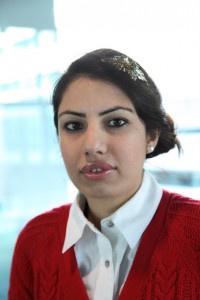 Spotlighting women’s issues in South Asia is the focus of a recently introduced multimedia project at Deutsche Welle. Three young female journalists from Pakistan, Afghanistan and India were sponsored by the Friedrich Ebert Foundation to help launch the undertaking in Bonn.
Spotlighting women’s issues in South Asia is the focus of a recently introduced multimedia project at Deutsche Welle. Three young female journalists from Pakistan, Afghanistan and India were sponsored by the Friedrich Ebert Foundation to help launch the undertaking in Bonn.
Their online dossiers feature reports in Hindi, Urdu, Dari and English on topics such as maternal mortality and healthcare, women’s rights and the role of women in business and society.
“Good journalism promotes positive changes in society,” says Ayesha Hasan of Pakistan, one of the visiting journalists who participated in the kick-off of the Women’s World project in late 2011. Reflecting on the role of free media, Hasan says they “can bring about peace within Pakistan as well as with its neighbors.”
![]() read more
read more
Tips to ensure effective and clear online writing
 Whether editing your own online writing or articles prepared by others, it’s a good idea to make sure you haven’t overlooked any details before you publish.
Whether editing your own online writing or articles prepared by others, it’s a good idea to make sure you haven’t overlooked any details before you publish.
Here’s a practical checklist of questions to ensure you’ve covered all the bases when it comes to solid journalistic style and user-friendly online presentation.
![]() read more
read more
Getting everyone up to speed in a converged Himalayan newsroom
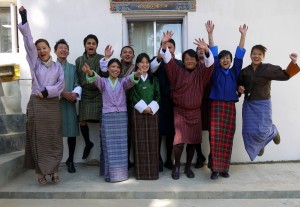 Even high in the Himalayas, reporters these days are being asked to do more.
Even high in the Himalayas, reporters these days are being asked to do more.
As part of a modernization drive, Bhutan Broadcasting Service (BBS) has combined their radio and television newsrooms. In the future, reporters will be required to provide news reports in both media. It’s hoped that the convergence will allow the state-funded station to cut costs and do more with limited resources.
It was against this background that two DW-AKADEMIE trainers went to Bhutan’s high-altitude capital Thimphu to conduct a workshop with an enthusiastic group of 12 young BBS journalists. While several already had some radio production experience, many had previously only worked on the TV side of things.
Together, the group started with a review of the basics, such as news judgment and news writing for radio, before moving on to the interview and how to ask that all-important first question that will grab your listeners and keep them from turning the dial.
![]() read more
read more
Histoires Africaines – tournages à Bamako
Il est minuit. Avec un soupir de soulagement Kadidia Haїdara et Ramata Konaté s’assoient. Elles posent la caméra, ferment l’ordinateur. C’est fait. Le dernier commentaire enregistré, leur reportage est enfin terminé. Avec les dix autres collègues venant du Mali, du Burkina Faso et du Niger, Kadidia et Ramata ont beaucoup travaillé ces derniers jours durant l’atelier “Histoires Africaines” à Bamako. Ils se sont tous beaucoup engagés lors du tournage, ils ont discuté vivement le choix des images au moment de montage et ont méticuleusement choisi chaque mot du commentaire.
![]() read more
read more
African Stories: different countries but facing similar challenges
I think for any trainer it’s very satisfying after two weeks of intensive television production training to see on the last day, participants proudly holding in their hands the DVD featuring the TV stories they had produced during the course. But most importantly for participants, they’re returning to their home stations from the African Stories workshop in Kampala with feature stories ready for broadcast and motivated to put new storytelling skills into practice.
![]() read more
read more




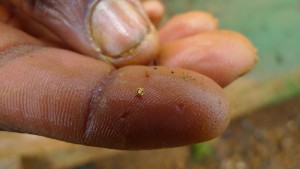

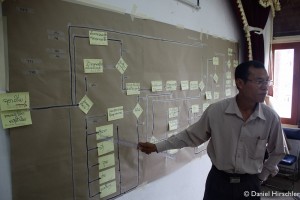
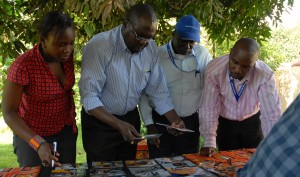




Feedback